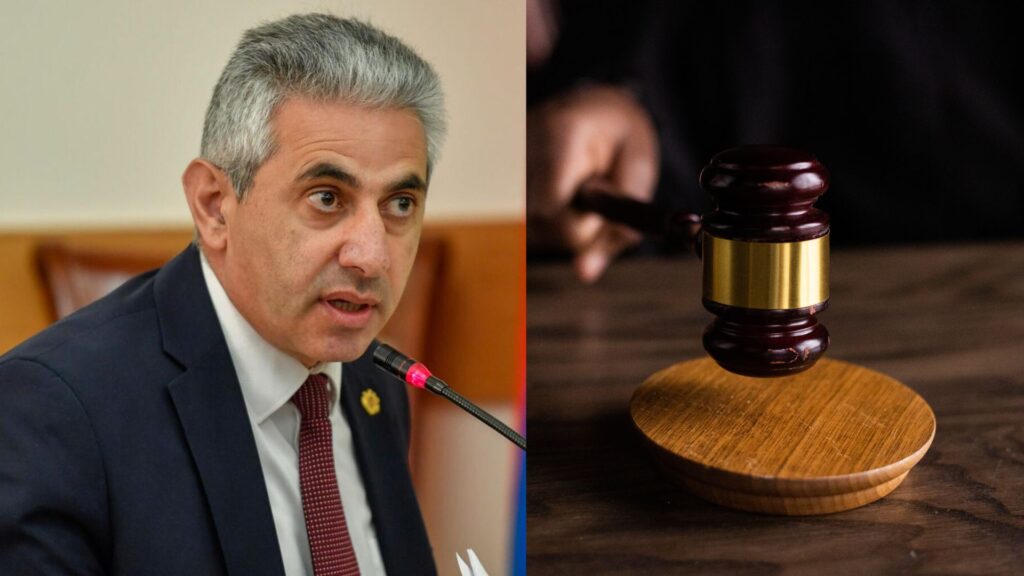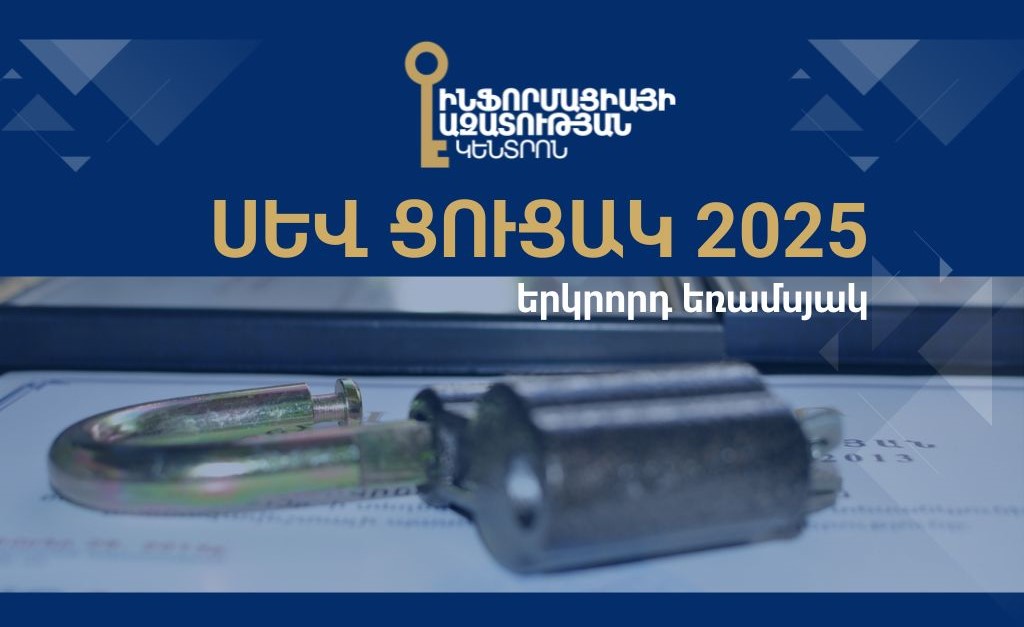FACTS
Politician Edgar Ghazaryan is facing charges under Article 490 (2) of the RA Criminal Code. According to information available on Datalex.am, he is accused of making public statements between August 28 and October 9, 2024 that discredited the judges of the Constitutional Court and caused damage to their rights and legitimate interests. In particular, the court used Ghazaryan’s criticism of the judges of the Constitutional Court in relation to the adoption of decision DCC-1749 as factual grounds for the accusation.
Adopted on September 26, 2024, this decision addresses whether the obligations prescribed in the Regulation “On Joint Activity of the Commission on Delimitation and Border Security of the State Border between the Republic of Armenia and the Republic of Azerbaijan and the State Commission on Delimitation of the State Border between the Republic of Azerbaijan and the Republic of Armenia” are in compliance with the Constitution.
In the course of the examination of the criminal case, a preventive measure was imposed on Edgar Ghazaryan in the form of a travel ban. On February 21, 2025, another preventive measure was introduced—administrative supervision. This measure specifically prohibited Ghazaryan from publicly making any discrediting remarks about the individuals covered by Article 490 of the Criminal Code—judges, compulsory enforcement officers, prosecutors, investigators, lawyers and their relatives.
On March 4, 2025, the criminal case, along with the indictment, was sent to the Court of General Jurisdiction of Yerevan. The first court hearing was set for March 24, 2025, during which the defense team challenged the lawfulness of the preventive measures, but the court left them unchanged. No specific term was set for the administrative supervision, and the examination of the criminal case is still ongoing.
CONCLUSION
Edgar Ghazaryan is a public and political figure against whom a criminal case was initiated based on his public statements. These statements were intended to communicate certain information and ideas to the public, with Ghazaryan exercising his right to freedom of expression. This being an information dispute, conducting an expert analysis and offering an opinion on it falls within the scope of the IDC’s professional activities.
Given that the IDC does not have access to the materials of the criminal case, the court proceedings are still at an early stage, and numerous details remain undisclosed due to the confidentiality of the preliminary investigation, the IDC refrains from addressing the grounds of the case. However, the IDC believes that the available materials are sufficient to express a position on the preventive measure, insofar as the issue in question concerns freedom of expression.
The application of a preventive measure that prohibits an individual from publicly criticizing judges constitutes an interference with the right to freedom of expression. This approach has been repeatedly reflected in the precedent-setting decisions of the European Court of Human Rights (in particular, the case of Obukhova v. Russia, Application No. 34736/03, 08/01/2009, paragraph 20).
Public criticism of courts and judges is an aspect of freedom of expression under Article 10 of the European Convention on Human Rights. According to the European Court, as judges form part of a fundamental institution of the State (the judiciary), they may as such be subject to personal criticism within the permissible limits, and not only in a theoretical and general manner. Moreover, when acting in their official capacity they may thus be subject to wider limits of acceptable criticism than ordinary citizens (Morice v. France, Application No. 29369/10, ECHR, 23/04/2015, paragraph 131). Accordingly, all the principles related to the protection of freedom of expression under Article 10 of the European Convention and Article 42 of the RA Constitution are applicable to Edgar Ghazaryan.
There are three such principles: any measure restricting freedom of expression must be prescribed by law, pursue a legitimate goal, and be necessary in a democratic society. Drawn from the European Convention on Human Rights, these requirements are broadly applied in Armenia, and since 2011, have achieved certainty, completeness, and stability in judicial practice, especially in legal processes related to political discourse. Although this practice has been developed mainly within civil proceedings, there have also been judicial acts in criminal cases, where courts have assessed the charges in light of Article 10 of the European Convention, weighing provocative, disturbing speech against its public significance and the importance of political speech in a democratic society.[1]
Let us first examine the principle of legality in more detail. It implies that any interference must not only have a legal foundation, but also that the law itself must meet the qualitative requirement of certainty and predictability. In this case, the terms “discrediting” or “causing other damage to the rights and legitimate interests” in Article 490 of the Criminal Code lack sufficient certainty to ensure predictability about which actions will lead to criminal liability and which will incur civil liability. After all, the aforementioned formulations also encompass public, critical speech that results in civil liability under Article 1087.1 of the Civil Code.[2]
In this regard, numerous rulings have been issued by courts in civil cases so far, and the RA Court of Cassation has established a body of case-law consisting of roughly a dozen decisions. There remains a lack of clarity as to which specific actions may be classified as “causing other damage” within the meaning of criminal law. It is equally uncertain whether, in the future, courts might view any criticism as speech that causes damage to the rights and legitimate interests of these individuals, leading to a conclusion that the preventive measure has been violated, thereby triggering all the resulting negative implications. Thus, the decision to apply a preventive measure restricting Edgar Ghazaryan’s right to freedom of expression lacks sufficient certainty and, therefore, fails to meet the requirement of legality.
The proportionality of the restriction also raises concerns. The preventive measure imposed on Edgar Ghazaryan prohibited him from making any statements covered under the full scope of Article 490 of the Criminal Code, including regarding prosecutors, investigators, heads of investigative bodies, investigative authorities, lawyers, representatives, experts, compulsory enforcement officers and their relatives, despite the fact that the criminal case was initiated for critical statements directed at the judges of the Constitutional Court. In relation to such cases, the European Court, while interpreting the concept of “necessary in a democratic society” in paragraph 2 of Article 10 of the Convention, highlights that a preventive measure must not only pursue a legitimate goal, but also ensure “that the interference with the rights protected was no greater than was necessary to achieve it” (Obukhova v. Russia, paragraph 24). Meanwhile, in this situation, although the criminal case is under review for public statements about the judges of the Constitutional Court, the preventive measure covers a much broader range of individuals than necessary, thereby rendering this measure disproportionate.
The above-mentioned issues also have a direct logical connection to the very Article 490 of the Criminal Code, which, according to the IDC, should be removed from the Code altogether, and the legal protection of the judiciary’s reputation from public statements should be considered exclusively in the domain of civil law.[3] As long as the voiced opinions do not contain hate speech, calls for violence, incitement to hostility and other similar content, all forms of criticism, including that directed at the judiciary, even if expressed in a sharp manner or with harsh language, are protected by freedom of expression. Under these conditions, the use of criminal-legal mechanisms is disproportionate, jeopardizing the right to free speech, unhindered public debate on important facts, events and phenomena, and, as a result, is not necessary in a democratic society.
If, nevertheless, Article 490 is objectively necessary for preventing crimes against the interests of justice, the IDC suggests amending that article, clarifying its criminal-legal content, getting rid of vague expressions (such as, for instance, the phrase “information that causes other damage to the rights and legitimate interests”), as well as drawing a clear distinction between the meaning of the term “discrediting” in criminal law and its civil-law equivalent under Article 1087.1 of the Civil Code—a provision that has been consistently interpreted by courts in civil proceedings since 2012.
There is no doubt that judges and prosecutors also need legal protection, and in this regard, the margin of acceptable criticism they may face is narrower than that of politicians and officials. This is conditioned by the fact that representatives of the justice sector have far fewer opportunities to respond to criticism directed at them than other groups in society. However, judges and prosecutors should not be immune from public criticism, or enjoy special legal protection, and publicly expressed critical speech about them should not lead to criminal liability, provided that the speech holds public significance and aims to serve the public interest.
Information Disputes Council
Shushan Doydoyan (IDC Secretary), President of Freedom of Information Center
Ara Ghazaryan, Director of “Ara Ghazaryan” Law Firm
Boris Navasardian, Honorary President of Yerevan Press Club
Aram Abrahamyan, Chief Editor of “Aravot” Daily
Ashot Melikyan, Chairman of Committee to Protect Freedom of Expression
Olga Safaryan, Lawyer
[1] See, for example, the acquittal verdict of the Court of General Jurisdiction of Yerevan regarding Aram Harutyunyan in criminal case ED/0323/01/21.
[2] See, for example, the interpretation of the term “discrediting” within the concepts of insult or defamation in Article 1087.1 of the Civil Code, as outlined in the decision of the Court of Cassation in civil case No. LD/0749/02/10, page 10.
[3] It is not accidental that back in 2017, Council of Europe experts proposed removing the earlier version of Article 490 from the draft Criminal Code, which contained nearly identical definitions. See Opinion of the Directorate General Human Rights and Rule of Law of the Council of Europe on the Draft Criminal Code of the Republic of Armenia, prepared on the basis of comments by Jeremy McBride and John Wadham, September 2017, p. 37.








